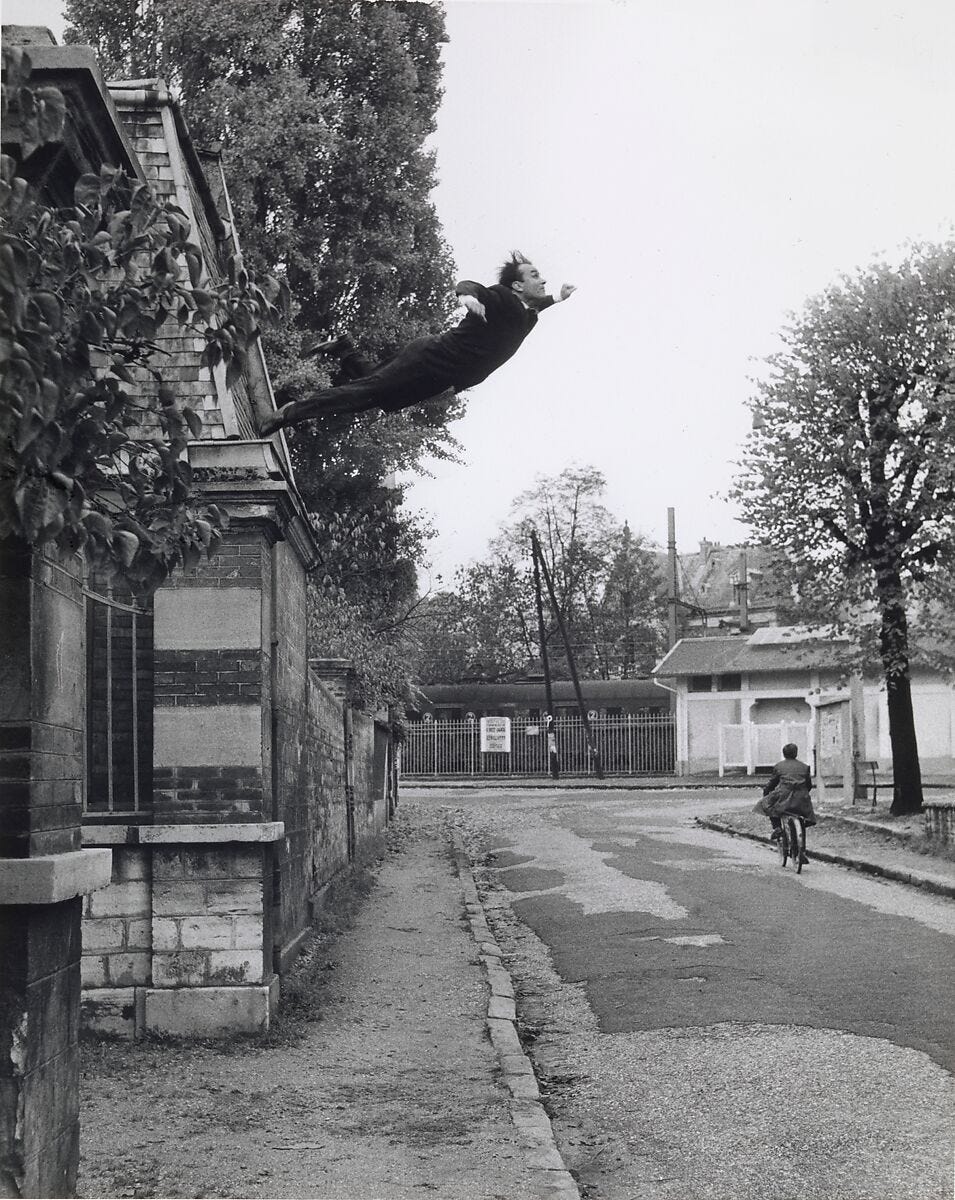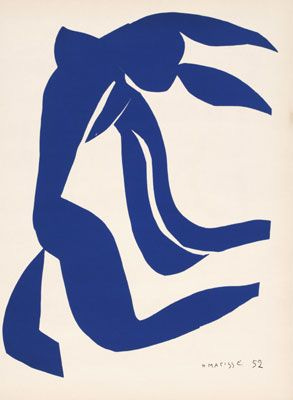a practical field guide to mystery
one autumn afternoon in 1960, Yves Klein wanted to catch the colour blue. so he put on a clean, black suit and jumped off of a roof.
“Have patience with everything unresolved in your heart and try to love the questions themselves” - Rilke.
dear little voice,
you are a machinery of awe.
your mind is like its own little universe. each time it hits its own limit, it extends beyond itself and into something unknown. you are human only in your willingness to the whole: the known, and the unknown.
I have a story for you, little voice. one autumn afternoon in 1960, Yves Klein wanted to catch the colour blue. so he put on a clean, black suit and jumped off of a roof.
Yves Klein: ‘Leap Into The Void’, 1960.
this photo, little voice, has come to represent the Leap of Faith essential to being an artist and a person: a windswept, passionate embrace of the unknown. Yves spent a lifetime pursuing Blue because, speaking of the nature of the mysterious, unknown pockets of our lives: ‘first there is nothing, then there is a deep nothing, then there is a blue depth.’
Yves did not know whether he would find Blue three metres up from the ground. but he did know that if he chased It, for a moment, he would fly. and he was willing to skim his knee on a cloud in the process.
‘where the void is found, there also lies fire’, proclaimed Yves.
Blue did not create his Art. mystery and possibility did.
what is your blue, little voice?
little voice, we are fragile creatures surrounded by a world of hostile facts that seal us off from the Blue of our lives. we are People, after all, and People are Doing Creatures. Doing Creatures have a deep, teleological, rational impulse toward absolutism, certitude, and perfect truth. we live in a world where Knowing is rewarded: we like numbers and facts, and the certainty they give us in the otherwise Strange Surprise of our personhood. we hoard facts and security as certificates of status and achievement. as wonderful american writer Rebecca Solnit remarks, our world is marred by “a desire to make certain what is uncertain, to know what is unknowable, to turn the flight across the sky into the roast upon the plate”. author Chip Ward named this the “the tyranny of the quantifiable,” or the way, ‘what can be measured almost always takes precedence over what cannot: private profit over public good; speed and efficiency over enjoyment and quality; the utilitarian over the mysteries and meanings’ of our lives.
quite simply: the Thinking World has no time for Blue. we like to know, and not knowing can make our hearts trip clumsily and our eyes move nervously in a dance we call fretting. we so deeply want to know, to be certain, that one of our most age old customs is to destroy the mysterious beauty of an innocent flower, petal by petal, in order to know with absoluteness whether they love [us], or they love [us] not. perhaps the real Leap of Faith would be tucking the magnolia into a lover’s pocket, or the rose beneath their pillow case, or the daisy in their loose autumn-stricken hair. perhaps instead of destroying possibility in pursuit of certitude, we can leap for Blue- even if we do not know whether It will leap for us back.
there is a reason Yves appears to be flying, little voice.
Matisse, Blue Nude.
this image of plucking petals is, I think, little voice, an acute symbol for the reductionist search for absolutism in our lives which so often partitions us from its abiding mystery. poetic existence, this analogy seems to suggest, is at the blooming heart of Not Knowing, and the search for absolute certainty in our own lives- whether it be in love, Art, success, family, spirituality, or money- serves only to strip us of the aspects of our lives that blossom in their magic to surprise, astound, and bewilder us.
after all, have you not loved all of your life the way a flower rises and opens, where truth grows and why birds fly, the flush of your heart in the high grass, and especially who the Moon is? and is it not too these things that you cannot know? you are what you are: a pursuit of the wind.
Joan Miro: ‘this here is the colour of my dreams’ // ‘ceci est la couleur de mes rêves’
as another poet, Jack Gilbert, writes, “Love, we say, / God, we say, Rome and Michiko, we write, and the words / Get it wrong.”
little voice, you do not need to know. you need to leap.
to know something is to remain in a room. yes, little voice, you are safe, yes. you do know where the kettle is, and the toaster, and perhaps the electrical plugs are not too difficult to find. you could live very comfortably in this room. but in seeing everything, little voice, there is no room for possibility. there is what does exist, but there is nothing of what might exist. but not-knowing, little voice, to live in mystery: this is to step outside of the room and toward an ocean’s distant horizon. what is that strange frosted sea? what is behind that shrouding, clouding mist? perhaps it holds a castle in the sky, or a balloon, or a great big eye.
to stay in a room, little voice, is to dismiss the richness of the Mystery of Not-Knowing. it is to impoverish our imaginations, and to preference certitude and safety over mystery. it is to never touch Blue: our most vulnerable and creative selves. it is to forget was the tender Carl Sagan most poetically said: “the universe will always be much richer than our ability to understand it.”
“Mystery is the capacity of something to keep becoming, to go beyond, to be uncircumscribable, to contain more…”
Virginia Woolf
little voice, a fact for you: the late 19th century poet John Keats termed this trait ‘negative capability,’ believing that true poets- or those little voices most intimate with their own humanity- are “capable of being in uncertainties, Mysteries, [and] doubts, without any irritable reaching after fact and reason.” the willingness to embrace life’s uncertainties, live within its mystery, and share a bed comfortably with its ambiguity, little voice, is a special power: the power to bury self-consciousness, dwell in a state of utter openness to all experience, abandon the need to make sense of the world, and instead identify one’s own little voice as an essential machinery of awe in this strange, baffling, sprawling world.
“Beauty is truth, truth beauty’—that is all / Ye know on earth, and all ye need to know.”
John Keats
Jean Cocteau, The Secret of Blue.
little voice, there is only one way to touch Blue: “you must learn to love the questions themselves”.
In a 1903 letter to his protégé, the 19-year-old cadet and budding poet Franz Xaver Kappus, the spectacular Blue-seeking poet Rainer Maria Rilke writes:
“I want to beg you, as much as I can, dear sir, to be patient toward all that is unsolved in your heart and to try to love the questions themselves like locked rooms and like books that are written in a very foreign tongue. Do not now seek the answers, which cannot be given you because you would not be able to live them. And the point is, to live everything. Live the questions now. Perhaps you will then gradually, without noticing it, live along some distant day into the answer.”
Rainer Maria Rilke
the true questioner is always unfurling and bursting forward like a gold thread, or a tent of birds. they are constantly in the process of welling up, rising up, surging up; always opening the two edges of the world wider, parting the two lips of the question, always differentiating anew, endlessly, ceaselessly, without boundary or horizon, are always feeling the Moon where their Mouth is. this is because, little voice, awe carries us to a place where worlds, nonexistent before, appear: worlds in which what is intimately ours, unmentionably ours, returns to existence, but almost unknown to us, and touched by the grace of the most delicate forms, like fossils or butterflies. This total surrender of one heart to Mystery, this quiet fullness of the soul, is perhaps our lives’ most essential victory over the heat and confusion of our little spinning world. this is your Blue, little voice. she is waiting for you.
“in every work of art something appears that does not previously exist, and so, by default, you work from what you know to what you don’t know”.
the great artist Ann Hamilton
everything ends in mystery, little voice. whether you are a scientist with a theory, or a theologician with a myth, you cannot concentrate your way to heaven, and these ideas too will have to be left behind.
little voice, life is babbling down the hill toward you, strewing flowers, and she has one thousand beautiful, unanswerable questions. for now you call out, receive no answer, and indulge in the calling again. and then one day you will enter a small, old house and an old garden where you may leave a long period of being apart from her, close to sweeping trees and a miasma of jasmine and to a few things humming with the gentle beating of an answer. what is here and now is, after all, what has been given and is expected of us and we must attempt to transform everything that happens to us into a new beauty and strangeness and poetry.
you cannot concentrate your way to heaven, no. but I do think perhaps you can live your way there. hold firmer to the mystery, little voice. touch your Blue. It is, after all, a leap of faith.
love,
ars poetica.
“From blue to blue. Such crystals of nucleic blue beauty, blue pain, blue memory, blue forgetting, blue childhood, blue old age, blue loss, blue sex, blue candy, blue music are 'fragments of the truth which attract to themselves, like a magnet, an inkling of the unknown…Words may fail, but you can hear the blue: it speaks a missing language.”
- Carol Mavor, “A Blue Lollipop”, Blue Mythologies: Reflections on a Color









gifting how big, how blue, how beautiful by florence & the machine to you <3